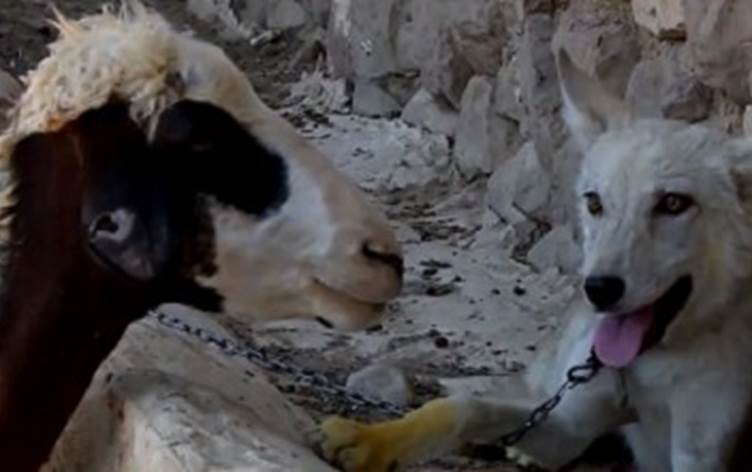ERBIL, Kurdistan Region – Shepherds from the town of Takiya, Sulaimani province, have domesticated six wild wolves, using some of them to protect their sheep from predators.
“We were seven shepherds in the deserts of the village of Bawapati Saru near the town of Takiya, when we encountered a wolf with nine cubs hiding in a hole in late January. After much effort, we managed to bring all of them home,” Khatab Talib, one of the shepherds, told Rudaw on Wednesday.
“We released the mother after a month because we couldn’t domesticate her. She was wild and violent. Three cubs died, and six are alive.”
The shepherds’ families, who have been domesticating the wolves for the past five months, said they used to be scared in the past that wolves might attack their sheep.
But it is now their pet wolves that protect the sheep from potential danger.
One of the wolves has been named ‘Cinderella’.
“The cub has lost its brutality. We are raising him at home. He doesn’t create problems. He goes around the rooms, playing with children. Wolves are beautiful, which is why people keep them. Many people come here or phone us asking us to give them the cub. Someone came from Dubiz yesterday asking for him. But we didn’t give him the wolf,” Herish Taha, a shepherd, told Rudaw.
Children in the neighborhood gather around the wolves to play with them.
“I look after the wolf after I come back from school. I am friends with him. He mainly plays with me,” Rezhin Herish, a student and daughter of Taha, told Rudaw.
Talib keeps two of the cubs and uses them to guard his sheep.
“We took the wolves back and raised them at home. In the beginning, we were giving them bread and milk. Nowadays, we give them dog food. We take them out with the sheep,” Talib told Rudaw.
“They don’t pose any danger to us or the sheep.”
“They were cubs when we took them from the desert back home. They behaved like predators at first, but pose no danger now that we keep them at home. They look after the sheep like dogs do. They have been harmless so far,” Ayub Ala’adin, another of the shepherds, told Rudaw.
“We were seven shepherds in the deserts of the village of Bawapati Saru near the town of Takiya, when we encountered a wolf with nine cubs hiding in a hole in late January. After much effort, we managed to bring all of them home,” Khatab Talib, one of the shepherds, told Rudaw on Wednesday.
“We released the mother after a month because we couldn’t domesticate her. She was wild and violent. Three cubs died, and six are alive.”
The shepherds’ families, who have been domesticating the wolves for the past five months, said they used to be scared in the past that wolves might attack their sheep.
But it is now their pet wolves that protect the sheep from potential danger.
One of the wolves has been named ‘Cinderella’.
“The cub has lost its brutality. We are raising him at home. He doesn’t create problems. He goes around the rooms, playing with children. Wolves are beautiful, which is why people keep them. Many people come here or phone us asking us to give them the cub. Someone came from Dubiz yesterday asking for him. But we didn’t give him the wolf,” Herish Taha, a shepherd, told Rudaw.
Children in the neighborhood gather around the wolves to play with them.
“I look after the wolf after I come back from school. I am friends with him. He mainly plays with me,” Rezhin Herish, a student and daughter of Taha, told Rudaw.
Talib keeps two of the cubs and uses them to guard his sheep.
“We took the wolves back and raised them at home. In the beginning, we were giving them bread and milk. Nowadays, we give them dog food. We take them out with the sheep,” Talib told Rudaw.
“They don’t pose any danger to us or the sheep.”
“They were cubs when we took them from the desert back home. They behaved like predators at first, but pose no danger now that we keep them at home. They look after the sheep like dogs do. They have been harmless so far,” Ayub Ala’adin, another of the shepherds, told Rudaw.








Comments
Rudaw moderates all comments submitted on our website. We welcome comments which are relevant to the article and encourage further discussion about the issues that matter to you. We also welcome constructive criticism about Rudaw.
To be approved for publication, however, your comments must meet our community guidelines.
We will not tolerate the following: profanity, threats, personal attacks, vulgarity, abuse (such as sexism, racism, homophobia or xenophobia), or commercial or personal promotion.
Comments that do not meet our guidelines will be rejected. Comments are not edited – they are either approved or rejected.
Post a comment